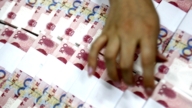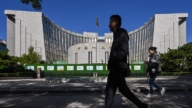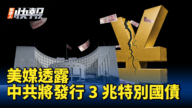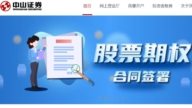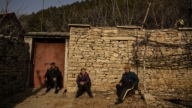【新唐人2013年09月03日訊】有關中國經濟所謂「奇蹟」的話題,外界的探討從未斷過。東京大學副教授川島博之,近期在接受日經BP社訪談時認為,在過去30年間,中國之所以實現了奇蹟般的經濟發展,其中,最主要的還是依靠讓土地生錢的機制。但是,他認為,目前中國經濟已經開始步入長期低迷。
9月1號,大陸《新浪財經》網站刊發了這篇採訪文章。
川島博之認為,在過去30年間,中國奇蹟般的經濟發展,除了依靠廉價勞動力,最具決定意義的,還是讓土地生錢的機制。因為中國的土地基本都歸地方政府所有。地方政府通過轉讓土地的使用權,盡情地擴大了收入,土地開發簡直成了要甚麼來甚麼的「萬寶槌」。
北京天則經濟研究所副所長馮興元:「九十年(代)財政體制改革以後,才開始財政收入集中到中央了,一大塊,這樣地方政府轉向土地財政。從96年開始中國的城市化率,每年保持在比較高的水平,這裡邊土地財政才開始發揮重要的作用。」
臺大經濟系教授張清溪表示,中國的土地所有權主要有兩種。
張清溪:「在城鎮叫國有,在農村叫階級所有,但都不是私人所有權。就是在中國土地都沒有私有財產權。 一般的人只能有使用權。 如果房屋被拆掉的話,他就甚麼都沒有,因為土地不是他的。」
張清溪指出,中共當局常常用各種方式把民眾現有的房屋拆掉,以此來再次轉讓土地使用權,增加收入。雖然中共宣稱拆掉會給補償,但是有時補償金也被政府官員貪污掉了。因此,造成的社會穩定問題,對中共政權是非常大的威脅。
2011年,《新京報》報導,中央農村工作領導小組副組長、辦公室主任陳錫文表示,農民上訪中涉及土地問題的比例約佔40%。征地問題已經成為農村很尖銳的矛盾。
同年發生的廣東烏坎村事件,就是由於村委會成員私下變賣土地問題,而引發的民間大規模維權抗爭。
此外,川島博之根據中國各省的城市面積等數據進行了推算,認為中國的土地使用費是265.7萬億元,這一數額相當於中國GDP的6倍。而一般來說,地價總額應當與該國的GDP相同,最多也只是2倍左右。所以川島博之說,中國的土地價格處於泡沫狀態。
而即使在對歐美出口減少的情況下,中共當局依然堅持爭取8%增長的GDP「保八」方針。即使工業部門低迷、消費增長停滯,也要想盡辦法拉動GDP。
因此,川島博之觀察發現,土地開發就成了地方政府唯一可走的路。但是,無視需求的荒唐開發,最終得到的卻是一座座鬼城。支撐著這些開發的資金,就是靠如今出現了嚴重問題的「影子銀行」籌措來的。
川島博之估計,今後,開發計劃夭折的情況還會不斷浮出水面。
張清溪觀察認為,金融問題是中共政權目前面臨的非常大的危機,這和它過去有大量土地可以賣有關。而且因為土地是公有的,所以政府使用起來不僅沒有效率,也沒有考慮長期經營。
張清溪:「好地方賣完,你就沒有土地,沒有土地你就沒有這個財源,因為土地只有一次性的。這個收入是很大筆,但是它一旦收完後就後繼無力了。這就造成很多地方政府因為後來沒有錢,它就開始用借貸。中國地方債是非常嚴重的。」
川島博之認為,中共的地方政府已經不能再像過去那樣揮動「萬寶槌」。地方政府一旦收斂投資,中國經濟必將急轉直下。畢竟中國GDP增長大約一半靠的是投資。
採訪/劉惠 編輯/王子琦 後製/李勇
China’s Economic Miracle Will Soon Pass
The outside world has never stopped talking about
China’s economic miracle.
Hiroyuki Kawashima, associate professor, Univ. of
Tokyo, recently told Nikkei BP in an interview that
in the past 30 years, China’s miraculous economic
achievements are due to reliance on the land as if it were a money tree.
However, he believes the current Chinese economy
has begun to enter a long-term slump.
On September 1, Mainland’s Sina Finance website
published an article with this interview.
Hiroyuki Kawashima believes that in the past 30 years,
in addition to relying on cheap labor,
China’s economic miracle is definitely due to
land development having become a money tree.
China’s land is owned by local governments.
Through transferring land’s user rights,
local governments enjoy expanded income,
and land development has simply
turned into a magic wand.
Feng Xingyuan, deputy director of Beijing Institute
of economics: “During the economic reform in the 1990s,
revenue went back to the central government.
A huge chunk of local revenue became land revenue.
After 1996, China’s annual urbanization rate
was kept at a rather high level and the land revenue began to play an important role."
Zhang Qingxi, professor of National Taiwan University:
“There are two main owners of China’s land.
The state owns all the towns and the classes (masses)
own all countrysides.
However, there is no private ownership of land in China.
Average citizens can only have the right to use the land.
If his house is demolished, he would have nothing
because the land is not his."
Zhang Qingxi pointed out that the Chinese authorities
often use various ways to remove existing homes in order
to re-transfer land user’s rights and increase revenue.
Although the Chinese Communist Party (CCP) declared
that home owners will be compensated, sometimes,
the compensation falls into the pockets of corrupt officials.
Therefore, it has turned into a social stability issue,
which seriously threatens the CCP.
In 2011, Beijing News reported that Chen Xiwen, deputy
head of the Central Rural Work Leading Group, said that
among farmer petitioners, 40% have land issues.
The land issue has become a very sharp conflict in villages.
In the same year, Guangdong Wukan incident was
caused by village committee members’ privately selling land, triggering a massive civil rights protest.
In addition, Hiroyuki Kawashima provided data
for China’s urban areas of all provinces, saying that
China’s land user fee is 265.7 trillion yuan,
equivalent to six times the GDP of China.
In general, the total premium should be the same
as a country’s GDP or twice as much at most.
So, Hiroyuki Kawashima said that China’s land prices
are in a bubble state.
Even in the case of reducing exports to Europe and America,
the CCP still insists on striving for 8% GDP growth.
The CCP will find ways to maintain a high GDP even though
the industrial sectors are in the doldrums and consumption growth stays stagnant.
Hiroyuki Kawashima found that the land development
has become the only option for local governments.
Ignoring the absurd land development has brought about
ghost towns everywhere.
Fundings for those developments came from the so-called
shadow banks, which have become a serious problem.
Hiroyuki Kawashima estimates that in the future,
more development plans will continue to be aborted.
Zhang Qingxi believes that the financial issue, currently
a big crisis for the CCP, has much to do with the sale of land.
Since the land is publicly owned, the government
uses it inefficiently and without a long-term plan.
Zhang Qingxi: “After coveted areas sell out, you have
no more land to sell and no more revenue from the land.
It is a one-time, big profit deal.
That is the reason why local governments were
so short of money and had to borrow money later.
Local government debt is a very serious problem in China.”
Hiroyuki Kawashima believes that the CCP’s local
governments can no longer wave their magic wands.
Once local governments decrease their investments,
China’s economy will nosedive.
After all, half of the China’s GDP growth depends
on investments.



